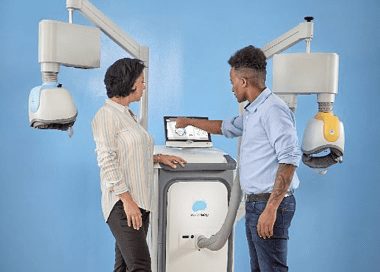BrainsWay’s Deep Transcranial Magnetic Stimulation, or Deep TMS™ treatment is a non-invasive treatment that safely regulates neural activity through the use of magnetic fields. Each Deep TMS session lasts about 20 minutes, with the overall Deep TMS treatment course taking several weeks, depending on the treatment type and the mental health condition being targeted.
The treatment course usually includes a shorter acute phase comprised of daily treatment sessions (five times per week), which is sometimes followed by a longer continuation phase comprised of two sessions per week. The acute phase regularly activates and regulates neural activity in an effort to significantly reduce symptom severity and prevalence. The continuation phase aims to maintain the treatment’s regulatory effect on the individual’s neural activity, which had begun during the acute phase.
During the acute phase’s initial treatment session, a licensed mental health practitioner carries out a 20-30 minute preliminary adjustment process, known as Motor Threshold Mapping. This allows the Deep TMS device to calibrate the patient’s relevant brain structures’ locations, and adjust the magnetic field’s intensity based on their response. A shorter adjustment stage is repeated once a week for the treatment’s further recalibration purposes.
Apart from the initial treatment session, each Deep TMS session lasts for roughly 20 minutes. As a non-invasive treatment, once the session is over, the patient can drive themselves home and continue with their daily routine. When treating OCD, a preliminary, three-to-five minute provocation stage is carried out, so as to “activate” the individual’s neural pathways for the treatment.
Following any necessary readjustments at the beginning of each session, the Deep TMS device is programmed to send out a series of pulses, activating a magnetic field that safely stimulates the targeted brain structures. This is done to regulate the relevant brain structures’ neural activity, which has been shown to successfully alleviate symptoms of mental health.
Deep TMS treatments offer relief for a number of mental health conditions, with each treatment varying in length and focus on the relevant brain structures.
Deep TMS treatment for depression normally includes a four-week long acute phase with five sessions a week, and an eight to 12-week continuation phase, with two sessions each week. In clinical practice, courses of treatment are typically between 30 and 36 sessions.
 Deep TMS treatment for OCD is somewhat different, with a six-week acute phase that includes five sessions a week. Patients undergoing Deep TMS treatment for OCD will also be presented with a script, images, or activity tailor-made to trigger their specific obsessions and compulsions, in an effort to activate the relevant brain structures.
Deep TMS treatment for OCD is somewhat different, with a six-week acute phase that includes five sessions a week. Patients undergoing Deep TMS treatment for OCD will also be presented with a script, images, or activity tailor-made to trigger their specific obsessions and compulsions, in an effort to activate the relevant brain structures.
In addition to being FDA-cleared to treat MDD and OCD, Deep TMS is also CE-marked in Europe for these and several other disorders. The full list of conditions Deep TMS is CE-marked to treat includes major depressive disorder (MDD); obsessive-compulsive disorder (OCD); Alzheimer’s disease; autism; bipolar disorder; chronic pain; Parkinson’s disease; post-traumatic stress disorder (PTSD); schizophrenia (negative symptoms); smoking cessation; and stroke.
Deep TMS offers proven results with shorter session times and a shorter overall treatment course. This was proven in 2019 in a study The American Journal of Psychiatry: the study found that a six-week course of Deep TMS treatment provided more than one in three patients battling OCD with significant symptom relief. These results mimicked the results of a 12-week pharmacotherapy treatment, concluding that Deep TMS improved patients’ quality of life in half the time as medication.
Deep TMS’s advantages go beyond its shorter treatment period, and include a high level of efficacy that still maintains the safety of its patients. This is in part due to its ability to reach deeper brain structures directly, allowing it to achieve significant results without increasing its magnetic field’s intensity, thus protecting the patient from any unnecessary side effects. As such, most patients do not experience any significant side effects, with a minority of patients reporting a minor, passing headache.
Additionally, Deep TMS’s ability to simultaneously reach more relevant brain structures adds to the treatment’s effectiveness, by including more of the structures shown to be associated with the targeted condition.
Innovative, effective and safe, with its many advantages, it is clear why BrainsWay is leading the charge in the fight for greater mental health.